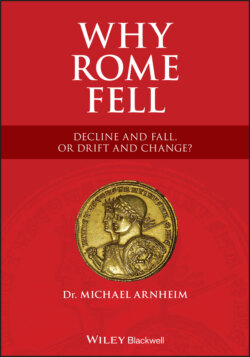Читать книгу Why Rome Fell - Michael Arnheim - Страница 32
Caesar’s Heir
ОглавлениеProbably the most significant provision of Caesar’s will was his adoption of his nineteen-year-old great-nephew, Gaius Octavius who also inherited three quarters of his substantial estate. But before he could take power, he had to emerge victorious from a two-stage civil war, first against the conspirators and then against his erstwhile fellow triumvir Mark Antony.
Emerging victorious in 31 BCE from the Battle of Actium against Antony, the young Caesar established a new form of government, which, with modifications, was to last for three centuries, with repercussions down to the present day. But what sort of government was this to be? There is a great deal of confusion among modern writers about the nature and even the name of this new form of government. In common parlance, Augustus is generally referred to as the first Roman “emperor,” and the system of government instituted by him as the “Roman Empire”. But this is neither clear nor accurate. See the discussion below.
